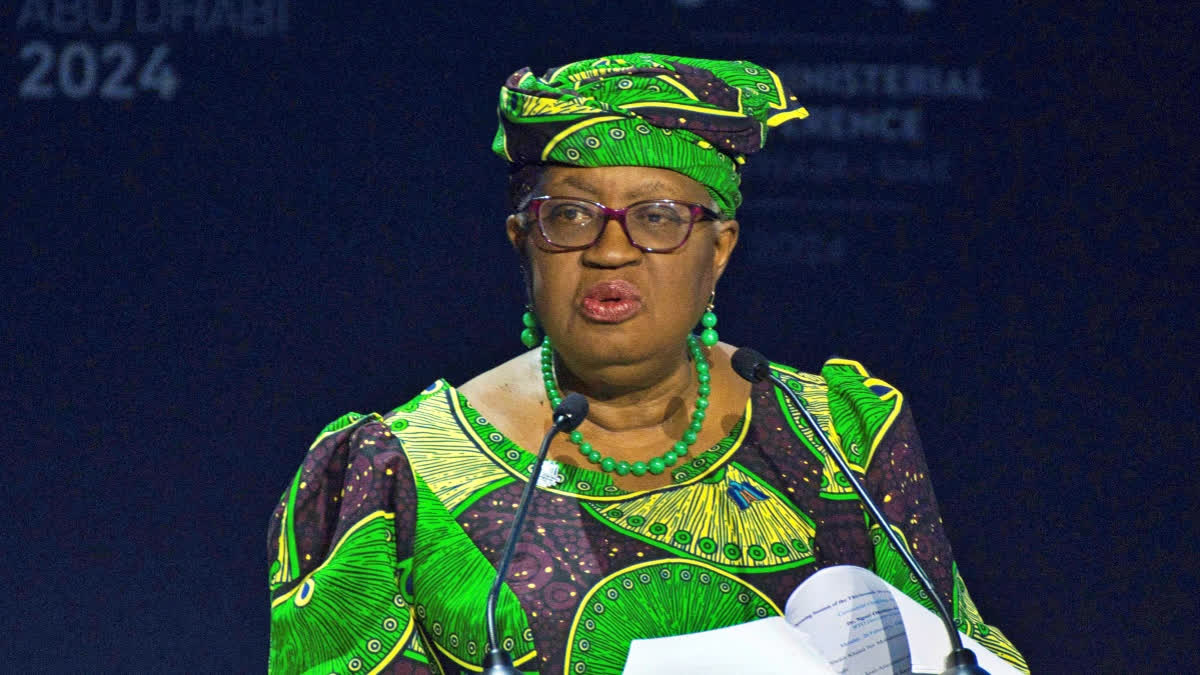Abu Dhabi:The head of the World Trade Organization warned on Monday that war, uncertainty and instability are weighing down the global economy and urged the bloc to embrace reform as elections across nearly half the world's population could bring new challenges.
WTO Director-General Ngozi Okonjo-Iweala sought to offer some praise for her organization as it held its biennial meeting in the United Arab Emirates, even as it faces pressure from the United States and other nations. But she was blunt about the risks ahead, as higher prices for food, energy and other essentials sting people's pockets, “fueling political frustration.”
“People everywhere are feeling anxious about the future and this will be felt at the ballot box this year,” she said. None are perhaps more critical for the WTO than the U.S. presidential election on Nov. 5. Running again is former President Donald Trump, who threatened to withdraw the U.S. from the WTO and repeatedly levied tariffs — taxes on imported goods — on perceived friends and foes alike. A Trump win could again roil global trade.
Okonjo-Iweala did not mention Trump by name, but offered a warning about attacks against multilaterism. “The multilateral trading system, which I term a global public good since it was created 75 years ago, continues to be misconstrued some quarters and undermined,” she said.
But even if President Joe Biden is re-elected, the United States has deep reservations over the WTO. The U.S. under the past three administrations has blocked appointments to its appeals court, and it’s no longer operating. Washington says the WTO judges have overstepped their authority too often in ruling on cases.
The U.S. also has criticized China for still describing itself as a developing country as it did when it joined the WTO in 2001. Washington, Europe and others say that Beijing improperly hampers access to emerging industries and steals or pressures foreign companies to hand over technology. The U.S. also says China floods world markets with cheap steel, aluminum and other products.
The WTO’s member-nations will discuss a deal to ban subsidies that contribute to overfishing, extending a pause on taxes on digital media such as movies and video games, and agricultural issues while meeting this week in the Emirati capital of Abu Dhabi. Also on Monday at the opening session, Comoros and Timor-Leste joined the WTO, bringing the number of nations in the bloc to 166.
But headwinds remain for the organization and the world’s economy, particularly as the recovery from the coronavirus pandemic remains uneven across nations. Okonjo-Iweala made no mention of Israel's war on Hamas in the Gaza Strip, though she noted the ongoing disruptions to shipping caused by Yemen's Houthi rebels in the Red Sea over the conflict.
“Shipping disruptions in vital waterways like the Red Sea and the Panama Canal are a new source of delays and inflationary pressure,” she said. WTO is also hampered by its voting format, with major decisions requiring consensus — meaning countries must actively vote in favor for proposals to take effect.
“If we thought the world looked tough in mid-2022, when we were slowly emerging from the pandemic and the war in Ukraine had shaken food and energy security, we are in an even-tougher place today,” Okonjo-Iweala said.
Read More
- India seeks to settle WTO import duty dispute with EU on ICT goods through free trade talks
- Ukraine complains to WTO about Hungary, Poland and Slovakia banning its farm products
